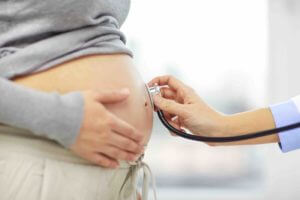Getting the circulation going – this is extremely important during pregnancy. When your circulation “goes crazy”, this is usually a clear signal that your blood pressure is low.
If possible, you should have your blood pressure checked whenever you have circulation problems during pregnancy. Values below 95 / 65 mm / Hg (millimeter mercury column) are called hypotension. And you should definitely do something about it – for your own sake and especially for the sake of your child.
Table of contents
That’s Why It’s So Important To Get Your Circulation Going
If your blood pressure is too low, it could lead to a lack of blood or oxygen supply to the brain. This also affects the heart and all other organs.
Fatigue, lack of drive, panic attacks, but also a massive drop in performance and irritability are often the result. Low blood pressure during pregnancy is also often accompanied by a feeling of dizziness, flickering eyes and circulatory problems in the hands and feet.
The Consequences Of Low Blood Pressure
Low blood pressure is manifested in many cases by very pale facial skin, by indefinable abdominal pain, as well as by breathing problems. Many pregnant women who have low blood pressure also complain of ringing in the ears, occasional hearing loss, and the need to yawn almost continuously.
Hyperventilation, severe palpitations and even hearing loss are also common when low blood pressure is present.
Avoiding Hypotension And Getting The Circulation Going
Feeling unwell and having trouble concentrating, feeling exhausted and quite a few other symptoms make it clear that you have circulation problems. In the case of pregnancy, this can pose health risks for your baby. For these reasons, too, it is essential to get your circulation going quickly.
This guide shows you how you can specifically get your circulation going and thus do the best for you and your unborn child. The symptoms that go along with it, when a pregnant woman has been diagnosed with low blood pressure, are very complex.
Lack of drive, performance and concentration problems, as well as fatigue and anxiety attacks are not only a temporary burden but also represent a considerable impairment of the quality of life. That’s why you should always make sure to get your circulation going with targeted measures.
Low And High Blood Pressure: The Difference
Low blood pressure, known as hypotension, is comparatively harmless for a non-pregnant woman – despite all the associated symptoms. This is because whenever there is low blood pressure, the vascular system is also put under significantly less strain or stress. In this respect, the risk of stroke and heart attack is much lower than for people with high blood pressure.
Note
With high blood pressure, the vascular system literally has to do “heavy lifting”. This is why the susceptibility to heart problems, cerebral hemorrhage, or stroke – depending on the physical constitution – is sometimes very high. On the other hand, low blood pressure is just as dangerous for expectant mothers!
The Most Common Symptoms Of Circulatory Problems
Expectant mothers who, for example, have to stand for long periods in their daily work often feel as if their legs are swelling. They get dizzy and feel their eyes flutter when they get up from a sitting position.
But even if these symptoms are joined by palpitations and a racing heart, it’s generally not a cause for concern. The reason your heart beats faster or more intensely at such times is to compensate for low blood pressure. Other reasons for such problems with circulation are often:
- Hot weather gets to many pregnant women, causing circulation problems.
- Hormonal changes sometimes contribute to causing circulation problems.
- Low blood sugar is a trigger for hypotension in many cases.
- A lack of exercise during pregnancy can contribute to a “weakening” of the circulatory system.
- Meals that are difficult to digest have a negative effect on the circulatory system.
- Insufficient blood flow to the brain often causes circulatory problems.
- Those who drink too little water often struggle with circulatory problems.
Circulatory Problems – A Danger For Mother And Child?
Symptoms that can usually be “dismissed” as harmless in non-pregnant women, because they only need to get their circulation going, should be interpreted as an alarm signal by expectant mothers.
This is because low blood pressure poses a serious risk to both mother and child because low blood pressure is associated with an undersupply of the uterus. The consequence of insufficient uterine blood flow could trigger complications during pregnancy and at birth. In addition, developmental disorders may occur in the child.
A Weakening Circulatory System – A Real Risk During Pregnancy
If low blood pressure becomes noticeable, you should definitely make sure to get your circulation going during pregnancy. Otherwise, fainting is not impossible in certain situations. In the worst case, this would mean that your unborn baby would be harmed by the collapse or the fall.
You should take into account that as the pregnancy progresses, you may experience significant dizziness. This can result from the uterus pressing on the great vena cava when you are in the supine position.
This is located in the back and is perfused by numerous blood vessels. If pressure is exerted on these, dizziness and flickering eyes, but also sweating, are not long in coming.
The so-called vena cava compression syndrome impairs the blood supply to the brain. Low blood pressure can drastically increase the risk of this occurring. To be on the safe side, therefore, make sure that you sleep with your back well padded and on your side if possible, especially in the last trimester of pregnancy.
This Is How You Can Get Your Circulation Going
Try to drink at least two to three liters of fluid per day. It is best to drink tap or mineral water and sugar-free herbal or fruit teas. Distribute the amount of fluid evenly throughout the day. In the evening, however, it is advisable to drink only a little.
When the alarm clock rings, it is important that you do not immediately “jump up” and start the day. First, gather yourself and prepare to get up for about two to five minutes. Then move slowly out of bed to preserve your circulation.
After getting out of bed, stretching exercises and light lolling and stretching is a great way to get your circulation going. This revs up your metabolism while gently preparing your body for the challenges the day will have in store.
Eat a snack, such as an apple, and drink a glass of lukewarm water. This also stimulates the metabolism. At the same time, the carbohydrates increase the blood sugar level and can also get the circulation going.
To get your circulation going in the long term, it is important to eat “good” carbohydrates. Fruit is a good choice in this respect – but not sweets. Because the sweets they contain are “bad” and therefore only increase blood sugar levels in the short term.
You can also get your circulation going with cold compresses or calf wraps. They stimulate your circulation and cause the blood vessels to constrict. This “pushes” the circulation and is additionally advantageous if you possibly suffer from varicose veins. Because of the narrowed blood vessels, varicose veins move visually into the background.
Why Can Circulation Problems Arise During Pregnancy?
Circulatory problems can already occur in the first days of pregnancy. In addition, circulatory problems also increasingly occur in the third trimester. The volume of blood increases by about 25 percent in the expectant mother.
That is one liter more blood that the female body has to “lift” or pump through the vessels. It is worth knowing in this regard that certain organs are particularly well supplied with blood during specific phases of pregnancy. Others, on the other hand, are less well supplied.
First of all, the kidneys experience a comparatively intensive blood supply. In addition, Mother Nature also directs her focus to the breast area, the pelvis, and the uterus. This is to ensure a full blood supply to the unborn child.
The Highly Complex Vascular System
Because some organs are thus supplied with a relatively large amount of blood and others to a lesser extent, circulatory disorders can occur in the affected parts of the body. This is why you may feel dizzy in certain situations and have the feeling that you need to get your circulation going.
In general, circulation problems are not unusual for expectant mothers. However, if you have to struggle with circulation problems more often or to a particularly high degree, then a visit to the doctor is unavoidable.
By means of a specific examination, you can find out whether these are merely classic circulatory problems typical of pregnancy – or whether there is possibly a more dangerous clinical picture.
Avoid Circulation Problems Through Diet, Rest And Mindfulness
Circulatory problems are generally not a cause for concern. However, expectant mothers who frequently suffer from low blood pressure and therefore feel poorly and unwell should definitely do something to get their circulation going.
This is because circulatory problems are often associated with an undersupply of blood to certain organs so that the health of the unborn child could be at risk. That’s why it’s important to regularly get your circulation going by taking thoughtful action and taking better care of your own physical well-being overall.
Conclusion
A healthy, balanced diet, light exercise as well as a lifestyle that is as relaxed as possible – all of these can help to prevent hypotension and thus support the good development of the child in the womb.
In the hustle and bustle of everyday life, it can happen that you put your own needs on the back burner. After all, the challenges that an expectant mother has to meet are sometimes very great.
In order to prevent circulation problems from arising again, you could ask your partner or best friend to “take care of you a bit more” and, if necessary, to point out to you to get your circulation going and to do something more for your well-being and that of your child.













2 thoughts on “You Can Get Your Circulation Going With These Tips”